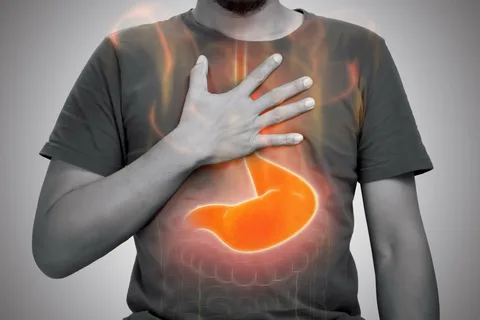Gastroesophageal reflux disease (GERD) is a chronic digestive condition where stomach acid frequently backs up into the esophagus, causing irritation and inflammation. While many people may associate GERD with occasional heartburn, the condition can become serious if not properly managed. Whether you’re newly diagnosed, suspect symptoms, or caring for someone with GERD, this evidence-based guide offers comprehensive insight into managing GERD for long-term relief and health.
What Is GERD? (GERD Meaning & Full Form)
GERD stands for Gastroesophageal Reflux Disease. It develops when the lower esophageal sphincter (LES)—the valve between the esophagus and the stomach—becomes weak or relaxes inappropriately. This dysfunction allows stomach acid to escape back into the esophagus, resulting in discomfort, inflammation, and long-term complications if not addressed.
Causes of GERD
GERD can be caused by multiple lifestyle and physiological factors. Key contributors include:
-
Weak lower esophageal sphincter function
-
Obesity or increased abdominal pressure
-
Hiatal hernia
-
Pregnancy-induced hormonal and physical changes
-
Smoking and alcohol use
-
Certain medications (e.g., NSAIDs, sedatives)
-
High intake of spicy, fried, or fatty foods
-
Eating large meals or lying down shortly after meals
Understanding these triggers helps guide preventive measures and treatment.
GERD Symptoms
GERD symptoms can range in intensity and frequency, commonly including:
-
Persistent heartburn, especially after eating or when lying down
-
Acid regurgitation
-
Chest pain or burning
-
Difficulty swallowing (dysphagia)
-
Chronic cough
-
Sore throat or hoarseness
-
Sensation of a lump in the throat
Frequent symptoms occurring more than twice a week should prompt evaluation by a healthcare provider.
Is GERD Dangerous?
Yes. If left untreated, GERD may lead to serious complications such as:
-
Barrett’s Esophagus – cellular changes that increase cancer risk
-
Esophageal Strictures – narrowing due to chronic inflammation and scarring
-
Esophagitis – inflammation or ulceration of the esophageal lining
-
Respiratory Conditions – like chronic asthma or aspiration pneumonia
Timely management is crucial to avoid progression.
GERD in Newborns
GERD also affects infants, typically within the first year. Watch for:
-
Frequent spitting up or vomiting
-
Arching the back during or after feeds
-
Chronic cough or wheezing
-
Poor weight gain
Most babies outgrow GERD by 12 months, but persistent symptoms should be evaluated by a pediatrician.
GERD Diet: What to Eat and Avoid
Managing GERD through diet is essential. Certain foods aggravate symptoms while others help soothe digestion.
Recommended Foods:
-
Whole grains (brown rice, oats)
-
Leafy greens (spinach, kale)
-
Non-citrus fruits (bananas, apples, melons)
-
Lean proteins (chicken, turkey, baked fish)
-
Herbal teas (ginger, chamomile)
-
Low-fat dairy options
Foods to Avoid:
-
Citrus fruits and juices
-
Tomatoes and tomato-based sauces
-
Spicy, greasy, or fried foods
-
Garlic, onions, chocolate
-
Caffeine and carbonated beverages
-
Alcohol and peppermint
Eating smaller meals and avoiding lying down within 2–3 hours after eating can significantly reduce reflux episodes.
GERD Treatment Options
GERD Medical Treatments:
-
Antacids: Provide quick symptom relief
-
H2 Blockers: Reduce acid production (e.g., famotidine)
-
Proton Pump Inhibitors (PPIs): Help heal esophageal tissue (e.g., omeprazole)
-
Prokinetics: Enhance stomach emptying and strengthen LES
GERD Lifestyle Changes:
-
Eat meals earlier in the evening
-
Elevate the head of your bed by 6–8 inches
-
Maintain a healthy BMI
-
Quit smoking and reduce alcohol intake
-
Avoid tight clothing around the abdomen
Always consult your doctor for personalized treatment options.
GERD Treatment at Home & Natural Remedies
Mild GERD symptoms can sometimes be managed at home through natural remedies and mindful habits:
-
Chew sugar-free gum to increase saliva and neutralize acid
-
Drink ginger tea or aloe vera juice (consult doctor for dosage)
-
Diluted apple cider vinegar – anecdotal remedy, approach with caution
-
Eat slowly and avoid overeating
-
Stay upright after meals for at least 2 hours
Caution: These natural remedies should complement—not replace—medical advice. Persistent or worsening symptoms require clinical evaluation.
Is GERD Curable?
GERD is generally a chronic condition, but many individuals achieve long-term relief through a combination of medication, lifestyle changes, and dietary management. In severe cases, surgical procedures such as fundoplication may be recommended to reinforce the LES.
How to Prevent GERD
Preventive strategies can significantly reduce both symptom severity and recurrence:
-
Maintain a healthy body weight
-
Avoid overindulgence and late meals
-
Identify and eliminate trigger foods
-
Refrain from smoking and excessive alcohol
-
Sleep on your left side to minimize reflux
Consistency in these habits helps prevent chronic inflammation and complications.
Final Thoughts
GERD extends beyond occasional indigestion—it’s a medical condition that can impair quality of life if left untreated. Fortunately, most people can manage GERD effectively with the right combination of medical care, dietary choices, and lifestyle habits.
From infants to adults, understanding the full scope of GERD equips you with the tools needed to control symptoms, avoid complications, and live comfortably.
Disclaimer: This article is for informational purposes only and should not be considered a substitute for professional medical advice. Always consult your doctor for diagnosis and treatment.



1 Comment
It’s arduous to find educated individuals on this subject, but you sound like you already know what you’re talking about! Thanks